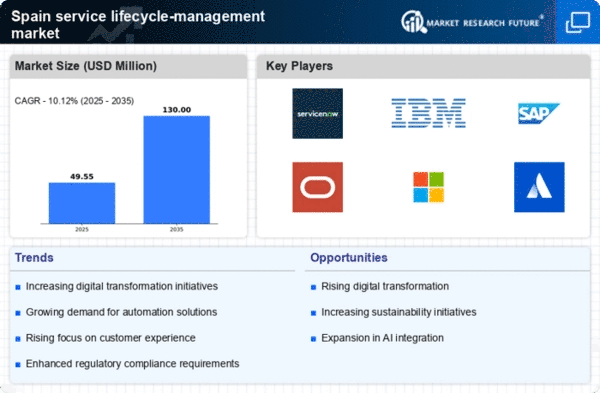Rising Demand for Automation
The service lifecycle-management market in Spain experiences a notable increase in demand for automation solutions. Businesses are increasingly seeking to streamline their operations, reduce manual errors, and enhance efficiency. Automation technologies, such as artificial intelligence and machine learning, are being integrated into service management processes. This trend is driven by the need for faster service delivery and improved customer satisfaction. According to recent data, the automation segment is projected to grow at a CAGR of 15% over the next five years. As organizations recognize the potential of automation to optimize service delivery, the service lifecycle-management market is likely to expand significantly.
Adoption of Agile Methodologies
The service lifecycle-management market in Spain is experiencing a shift towards agile methodologies. Organizations are increasingly adopting agile practices to enhance flexibility and responsiveness in service delivery. This approach allows businesses to adapt quickly to changing customer needs and market dynamics. The adoption of agile methodologies is likely to lead to improved collaboration among teams and faster service deployment. As companies seek to remain competitive, the service lifecycle-management market is expected to benefit from this trend. Research indicates that organizations implementing agile practices can achieve a 30% reduction in time-to-market for new services, highlighting the potential impact on the market.
Growing Emphasis on Customer Experience
In Spain, the service lifecycle-management market is witnessing a shift towards prioritizing customer experience. Companies are increasingly aware that exceptional service can differentiate them in a competitive landscape. This focus on customer satisfaction drives investments in service management tools that enhance communication, feedback, and responsiveness. Data indicates that organizations that prioritize customer experience see a 20% increase in customer retention rates. As businesses strive to create personalized and seamless interactions, the demand for advanced service lifecycle-management solutions is expected to rise, further propelling market growth.
Increased Focus on Data-Driven Decision Making
The service lifecycle-management market in Spain is increasingly influenced by the emphasis on data-driven decision making. Organizations are leveraging data analytics to gain insights into service performance, customer behavior, and operational efficiency. This trend enables businesses to make informed decisions that enhance service quality and optimize resource allocation. As companies recognize the value of data in driving service improvements, the demand for analytics-driven service lifecycle-management solutions is expected to grow. It is estimated that the data analytics market in Spain will expand at a CAGR of 12% over the next few years, further supporting the service lifecycle-management market.
Expansion of Digital Transformation Initiatives
The ongoing digital transformation initiatives across various sectors in Spain significantly impact the service lifecycle-management market. Organizations are adopting digital tools and platforms to modernize their service delivery processes. This transformation is characterized by the integration of cloud computing, data analytics, and mobile technologies. As companies transition to digital-first strategies, the service lifecycle-management market is likely to benefit from increased investments in innovative solutions. Reports suggest that the digital transformation market in Spain is set to reach €30 billion by 2026, indicating a robust environment for service lifecycle-management solutions.
















